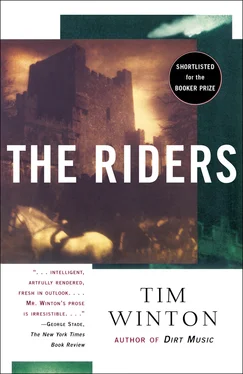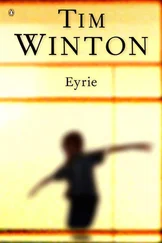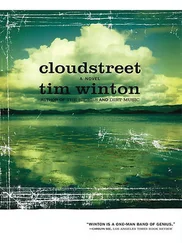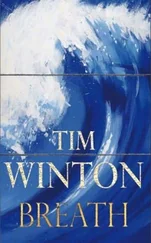He whipped back the eiderdown and roared with the shock of the cold, and it was while he was wrestling with his jeans that he saw the mud on his legs. It was caked between his fingers, too, and there in the sheets. He remembered the cold and the riders distantly, as though recalling a dream. This afternoon he’d go down and have a look around, just to satisfy himself. Maybe talk to Brereton. But now he was late. Now the sun was up.
He stripped the linen and took it downstairs where the hearth drew breath and the windowpanes chattered. He should have been up two hours ago. With this day hanging before him so long, how could he have slept in?
In water cold and hard as brass, he washed himself standing in a tin tub. He shaved badly and ran upstairs with clean sheets. Then he found his Levi’s, his boots and pullover and pulled himself into shape.
Eight thirty-five. Now he was frantic, frantic enough to heave the tub of grey water against the closed kitchen window which sent it right back at him. He sat down, soaked and sober, moaning in frustration. He looked around, saw the dishes in the sink, the dirty sheets and mud-scuffs, the pool at his feet. He’d worked his guts out to get the place near perfect and now it looked like a student dive. Still, they’d see the change, they’d know how his heart had gone into it. He got up, lit the fire, stacked it with coal, and went out into the wind in his wet clothes.
• • •
ON THE TWISTING HEDGE ROAD into Roscrea, Scully drove hard and close, sending up curtains of mud everywhere he passed, with the walls and blackthorn against the streaming windows. Rain smeared his glimpses of fields and open places. There was no sky.
The town was jammed with cars parked wildly for Mass, and bells rang along the close grey rows of houses and shops. Out on the open road, Scully pushed the Transit to the limit, jiggling now, sweating with anticipation. The hills spewed cloud and water and the Tipperary fields opened up to the rain, sprouting here and there the ruined backbone of a tower, a gatehouse, a manor of old. He saw cottages collapsing under the weight of thatch wild with grass. All down the highway, across the country, there were solitary chimneys, great lonely walls, fallen churches with lichened crosses tilted like levers in the earth. Much rarer was the sight of a stand of timber, a wood, a forest remnant before more chocolate soil and squat, stucco farmhouses with grey gravel forecourts and Spanish arches. Every town said Failte, Welcome to Moneygall, Toomyvara, Nenagh, and each was jammed with the cars of Mass and the umbrellas of the walking faithful and the toll of bells, while the roads were quiet and blessedly free of trucks. Three cheers for a God-fearing nation, Scully thought, and for truckers on bended knee.
In the slate sprawl of Limerick he caught the time in a chipper’s window as 9.55. He crossed the bridge and saw the choppy surge of the Shannon beating seaward, and somehow his tension broke for a moment into wellbeing: he’d make it now, he’d be there soon.
The rain backed off. The road was clear.
• • •
ON THE LONG, flat dismal approach to the airport, Scully was grinning so hugely that other drivers veered away and kept their distance. A Pan-Am jumbo heaved itself into the air and passed over with its shadow trailing like a dragged anchor. Bon voyage, he thought; enjoy New York, have a happy life, all you people. The world is good and the aeroplane a gift of evolution.
• • •
INSIDE THE TERMINAL BUILDING the air was thick with cigarette smoke, the smell of wet serge and the shouts of people leaving and meeting. Here and there were the checkerboard slacks of Americans making their way to the Avis counter and the Dan Dooley Rent A Car. There were Irishmen in terrible jackets and thick-soled boots heading upstairs for a pint, and women with briefcases awaiting the shuttle back to London.
Scully sat a moment beside a coin-operated fire engine and saw a man cross himself — spectacles, testicles, wallet and keys — on his way up the escalator to Departures. Go well, old fella, he thought.
The flickering monitor said the Aer Lingus flight from London would land in a minute or two. What timing! They’d be tired after the twenty Qantas hours from Perth and the wait at Heathrow. He’d cook them lunch, stoke the fire and put them to bed with the wind rattling outside. Hell, he’d climb in with them, sleep or no sleep. He wondered if he could find a decent bottle of wine somewhere in this country before dark. Not on a Sunday. Now he needed a leak. He was like a kid, jiggling and fidgeting.
Down the hall he found the Men’s. At the mirror he stared at himself a moment. His curls were ragged and upstanding, and his dodgy eye and flushed complexion gave him a desperate look. He was lucky the Gardai at the terminal entrance hadn’t pulled him aside to search him for a Semtex suppository. He grinned slackly, straightened himself up best he could, pushed his hair down with the sweat of his palms and went out to meet them.
The monitor flashed LANDED. A wall of people curved around the electric doors of the customs exit. Scully wormed his way in and with a bit of foul play he found himself at the front rail itself.
The briefcase jobs appeared first, snapping their trenchcoats about them, hardly looking up at the press of other people’s relatives at the chrome barrier. Then came the trolleys with their teetering stacks of suitcases pushed by the bleary and the weeping. Shouts of recognition commenced. Families grappled and sobbed at the rail. Babies were passed head-high to the front. Scully could barely stand the guffaws and shrieks of other people’s happiness. He was crushed sideways and shunted from behind and he began hopping from foot to foot, straining to catch some familiar feature in the oncoming stream of faces.
And then, waist high, he saw the blonde curls.
‘Billie!’
She disappeared behind someone else’s trolley.
‘Billeee!’
When she emerged he saw the small tartan suitcase in her hand, the fluorescent green backpack on her shoulders and the female flight attendant beside her. Billie’s eyes found him and blinked recognition. The poor kid looked pale and tired, completely wrung out. Scully looked for the trolley behind, that Jennifer must be pushing. He couldn’t imagine the excess baggage they must have forked out for. But the trolleys behind were all pushed by men. Scully saw the green sticker on Billie’s jacket. Saw her small hand holding the hand of the woman in uniform. Saw the clipboard and the brittle, cosmetic smile. He leapt the rail.
‘Billie, you should have waited for Mum.’
He grabbed her up, case and all, and felt her clinch him like a boxer. My God, but it felt good. She smelled of raspberry and of Jennifer. Through the haze of Billie’s hair he saw the trolleys coming on in small batches, then petering out altogether.
‘Mr Scully?’
He turned. The Aer Lingus woman smiled.
‘I’m afraid we need some identification, sir. The regulations, you know. She’s such a quiet girl.’
‘I’m sorry, I don’t think I… she’s got her passport, hasn’t she?’
‘Oh, yes, I have it here.’
Billie pressed into his neck so that he felt his blood beating against her forehead.
‘Well, what identification? Have they lost the bags?’
‘No, sir, this is all there was.’
‘It’s okay, we’ll wait,’ he said, smelling Billie’s hair; he was delirious.
‘Just a driver’s licence, Mr Scully, and a signature. All unaccompanied child passengers need —’
‘What did you say?’
He lifted Billie and saw the Junior Flyer badge. He put the child down and took the proffered clipboard as though it was a bloodied weapon. Unaccompanied Child Passenger B. Scully, female, seven years old. Scully held the little pen in his hand and let it shake above the paper and then looked back at the Aer Lingus woman.
Читать дальше












